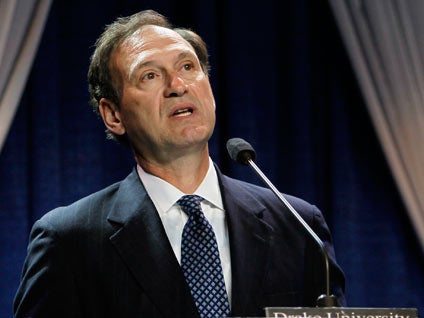Alito Emerges as Supreme Court Rock Star
Supreme Court Justice Samuel Alito speaks about constitutional law during a lecture at Drake University, Thursday, Sept. 30, 2010, in Des Moines, Iowa.
(Credit: AP Photo/Charlie Neibergall)Some of the more liberal justices, like Ruth Bader Ginsburg, appeared sympathetic to the protesters and worried about restricting speech. Some of the conservatives, like Justice Samuel Alito and Chief Justice John Roberts, appeared ready to suggest there are limits to the First Amendment--and a funeral protest is a pretty good place to draw the line.
But that doesn't get you to five votes---and I'm not betting the family farm that even those three are sure things.
So with all the uncertainty, here are three things I can say for sure after Snyder v. Phelps.
1. Justice Alito has emerged as the Court's most insightful and strategic questioner at argument.
Today's session was a tour de force. He laid bare weaknesses in the protesters' case with savvy hypothetical questions that exposed potential dangers in adopting their arguments. He's like a one-justice Delta Force: He's so quiet and low-key while drawing in the lawyers with his questions that he manages to plant several bombs before they even realize he's on the attack.
2. Justice Scalia needs to drop it.
Scalia is in danger of becoming a caricature of himself, if he's not there already, and he's hurting his cause at argument. One example from today. Justice Alito (aka "rock star") posed a devastating hypothetical question about whether anti-war protestors could confront an elderly woman who had just left the grave of her grandson, a soldier killed in Iraq.
The question was vivid and moving, and you could picture the scene: the grieving grandmother, waiting at a bus stop, where she's confronted by a protester who speaks to her, as Alito says, in "the most vile terms." The protester describes roadside bombs and how her grandson's body was blown apart, and he says "I only wish I were there to take pictures of it." It's a matter of public debate--the war. So is that protected, he asked.
The church's lawyer, Margie Phelps, suggested those might be fighting words. No, Alito says, she's elderly.
And then Scalia can't help himself. "She's a Quaker, too," he interjects. Ok, ha ha. Funny. The courtroom erupts in laughter. But what's the point of it? It was a terrific question by Alito, and Scalia weakened it.
3. Justice Kennedy remains, and will always be, uniquely Justice Kennedy.
From today's argument (join me now in humming "We Are the World"): "That simply points out that all of us in a pluralistic society have components to our identity; we are Republicans or Democrats, we are Christians or atheists, we are single or married, we are old or young."
Seriously. That's a direct quote. We are shaking our heads in wonderment.

